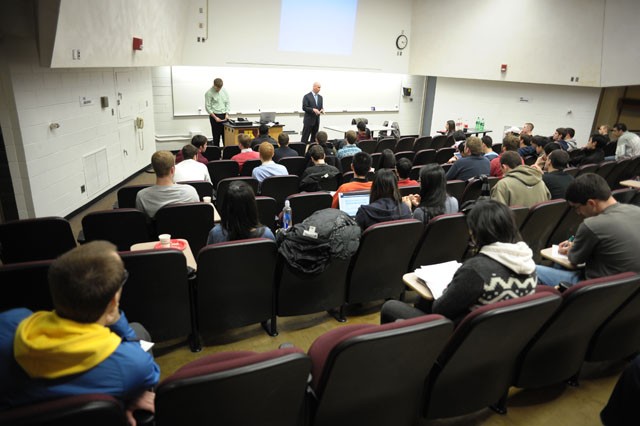Some of the worldâÄôs biggest corporations are helping the Stock TraderâÄôs Club at the University of Minnesota learn more about the industry through actual investments.
The groupâÄôs investment fund has stocks in Apple Inc., BP and Ford Motor Co., STC President Travis Jakel said.
The fund is STCâÄôs most recent initiative after the club had been disbanded for close to a year. Jakel assembled a board in the spring semester of 2010 and re-established the club.
STC has 60 paying members, 18 of whom are part of the investment fund.
The fund was started at the end of December 2010. After pondering the idea for a while, Jakel asked members if they were interested in investing some of their own money.
“We got a feel for the interest of it and felt there was enough to start it up,” he said.
The group currently has $5,650 in its investment fund.
STC developed a democratic process in which the 18 investors can decide what companies the money goes toward.
In order to be a part of the fund, each member must contribute a minimum of $50. Every $50 a member gives equates to one vote in deciding what to do with the fundâÄôs money.
The voting process is conducted anonymously online. The group aims to have at least 80 percent of the votes in favor of buying or selling a stock before ultimately going through with the decision.
Members can put in or take out their money from the fund at the beginning and end of each semester. When they take money out, the amount will be adjusted based on the performance of the stocks.
The group has also invested in Level 3 Communications and an exchange-traded fund in agriculture.
Jakel said the investment fund was created as a way to get the most out of investments while learning more about the stock market.
“I really think if you have skin in the game, you really pay attention,” Jakel said. “YouâÄôre more apt to go home and track whatâÄôs going on.”
Every other week, STC invites speakers, who range from financial analysts, portfolio managers and recruiters, to their meetings. On the weeks without speakers, the group presents potential stock investments after researching candidates.
“ItâÄôs been tough to find time in between speakers to invest the money,” Jakel said. “I think thatâÄôs probably the most difficult part so far.”
The group currently has 60 percent of its fund in the stock market. They invest 10 percent at a time.
For members who are not in the fund, STC holds a competitive virtual stock game throughout the semester. Based off the actual stock market, members have $10,000 in virtual capital to invest.
Finance junior Brannon King, STCâÄôs treasurer, said he hopes the virtual stock game serves as a learning platform for members interested in investing in the fund.
“The simulator is such a fun thing to do, and the mentality of trading fake money is a little bit different,” he said. “ThatâÄôs why we created the investment fund.”
Political science sophomore Nick Tessman joined STC this year and is part of the investment fund.
“ItâÄôs a real interesting experience for me since IâÄôve never been part of that process before,” he said.
Since heâÄôs not in Carlson School of Management, he said STC has been a valuable introduction to the field.
“It helps me get a better understanding of the financial sector,” Tessman said.
STC also hosts guest speakers in hopes of educating members.
“In an industry thatâÄôs getting more and more difficult to break into, sometimes hearing from those people that are in the industry becomes more valuable information,” King said.
STC co-hosted an event with the Investment and Finance Organization on Tuesday afternoon featuring Jim Fehrenbach, head of sales and trading for Piper Jaffray & Co., and Steve Kuhn from Pine River Capital Management, a hedge fund based out of Minneapolis.
Fehrenbach and Kuhn each presented for about an hour. They touched on business models within the industry, their personal experiences and how different backgrounds correlate to their companies.
Jakel said he knows of members who have begun trading stocks based on their experience with STC. And with membership doubling since last year and a low turnover rate each semester, he said he hopes to attract more people interested in the stock market.
“ItâÄôs tough to break into the business financial industry when the economy is tough,” he said. “YouâÄôll get a lot of students gravitating towards groups like Stock TraderâÄôs Club.”


